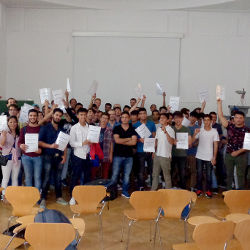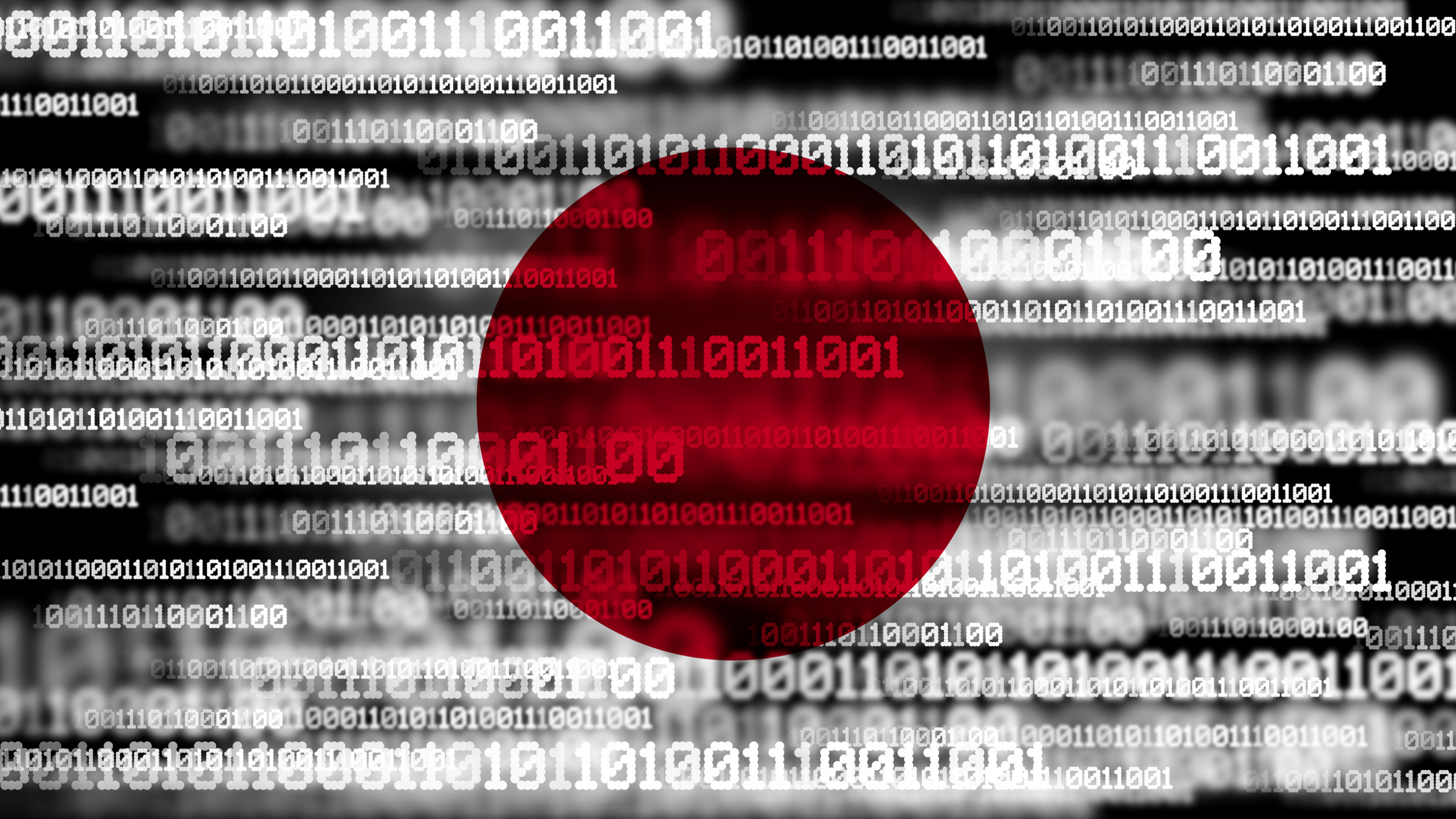
The current crisis of refugees has divided European countries and societies into those who welcome refugees and those who oppose taking them. In this Viewpoint, we reflect on the role of universities and of computer science in such situations. As a case study, we describe an activity taken at the TU Wien (Vienna University of Technology): when the crisis of refugees culminated in summer 2015, a group of professors and students of the Faculty of Informatics initiated computer courses for unaccompanied young refugees. This project allowed the refugees to gain computer-related knowledge, and, equally important, to make contacts with local students. Another major goal of the project was to give a clear message that refugees are welcome. Considering the attention received in the media and in the public, we are convinced universities have significant influence and reputation in society that puts them in a favorable position to promote tolerance and to encourage other institutions to act similarly.
When this Viewpoint was written in early 2016, the crisis of refugees due to the wars in the Middle East had become one of the main European problems. The regional governments in the neighboring countries and in Europe are overwhelmed and have not yet been able to find good, or at least feasible, solutions to this problem. Furthermore, this crisis has divided the European leaders and countries. On one hand, several states have been opening the borders for the refugees and many citizens have shown solidarity. On the other hand, a serious increase of intolerance toward the refugees in many European countries has to be reported. Furthermore, right-wing political parties in different regions have gained substantial popularity and have been (mis)using the current situation to reach their goals in elections.
In our opinion the universities have not been active enough (at least in the public) regarding the current refugee crisis. Here, we would like to inspire a discussion regarding the role of universities in such situations. We will briefly address the following questions: Should the universities take a more active role in such cases like the crisis of refugees by taking a clear position that promotes tolerance, and should the universities be more active to find solutions for such problems? What is the role of computer science regarding these issues? Further, we will express our opinion regarding these questions and describe an activity taken at the TU Wien (Vienna University of Technology) to support young refugees (between 14–18 years old) and to signal to them that they are welcome.
The Crisis of Refugees
Due to the current wars in Syria and Iraq the number of refugees has been increasing tremendously. According to the UNHCR the total number of Syrian refugees exceeded four million in July 2015 (UNHCR, Press Releases, July 9, 2015: http://bit.ly/1G8LY0k). Although most refugees from Syria have been fleeing to neighboring countries, hundreds of thousands of refugees (including those from Afghanistan, Iraq, and African countries) have fled this year to European states. Sad to say, thousands of refugees have lost their life on their way to Europe using boats or inside trucks. These tragic events and the continuous flow of refugees have sensitized Europe. However, as mentioned, Europe is deeply divided regarding the refugee crises. Several European countries have opened their borders for refugees and have been welcoming them, but unfortunately several other countries are not welcoming the refugees and oppose taking them. This division could also be observed among the inhabitants of Europe. Whereas an enormous number of citizens (in the best sense) in several countries have shown solidarity and have been volunteering to help the refugees, many others have been spreading intolerance. Several right-wing political parties that made the issue of refugees the main topic in elections have been increasing their votes. The situation in Europe is expected to get tenser in the following months as the number of refugees is expected to increase further.
The Role of Universities in this Crisis
Universities are focused on research and teaching, on knowledge creation and distribution. This leaves them with an important role in the society. But this can not only be seen in “utility” or “usefulness” terms, in our view a university should also reflect on the society, its developments and problems, it should try to identify solutions and, finally, take position even in “rough times.” Currently in Europe an intensive political debate regarding the refugee crisis is taking place and clear positioning of universities regarding refugees is crucial, because their influence and reputation is significant. The necessity of engagement of universities in the refugee crisis has also been mentioned recently by Austrian politicians following the lecture of Dr. Jeffrey D. Sachs “Special Lecture: What Is the Role of a Modern University in the Fight Against Inequality?” in European Forum Alpbach 2015 (http://bit.ly/2aPfnof).
Regarding the refugee crisis we think university computer science departments could take several possible actions to position themselves as supporters of human rights and also influence the opinions of other people regarding this sensitive issue. In our opinion, these actions could include, among others, the organization of specific courses for refugees and research projects dealing with specific problems regarding the refugees. The computer science departments in particular are in a good situation, because learning the basic IT skills and computer knowledge is essential in our society, rich of artifacts and applications. Therefore, several activities that fall under the umbrella of computing for the social good concept1,2 could be taken.
University computer science departments could take several possible actions to position themselves as supporters of human rights.
For example, the computer science departments could organize short-term computer courses for young refugees, offer online computer courses specialized for them (to enable them to integrate quickly into society and increase their chance to find jobs), consider student projects for developing specific apps for the refugees, and other initiatives. With this respect one could think of a multitude of useful applications in this field and even of specific social innovation activities, linked to IT. Another innovative issue, as in our case, could be to organize traineeships for refugees in start-up companies.
Case Study at the TU Wien
Following the controversial discussion regarding the refugees in Austria at the time when the number of refugees was increasing, a group of professors at the Faculty of Informatics at TU Wien took an initiative to organize summer courses for unaccompanied young refugees (age between 14 and 18). The student body of our faculty joined the action immediately and the project was named Welcome. TU.Code. The intention was to give a clear message that the refugees are welcome in Austria.
After the preparatory work in June/July 2015, the computer courses began in the end of July and took four weeks. Around 60 young refugees from different countries (including Syria, Afghanistan, Somalia, and Iraq) were among the participants of these courses. One of the challenging questions was which curriculum to teach in these courses. The initial curriculum included computer programming for kids, but due to the heterogeneity of the refugees and their different needs the curriculum was adapted and changed to better match the participants’ background and interests. The complete curriculum for these four weeks included game programming for kids, basics of operating systems, Internet and basics of security and privacy, and office applications. Furthermore, for few advanced participants programming in Java and Python was taught individually. This was only possible because tutors—computer science students of the TU Wien—had knowledge from these different areas and were flexible in their approach and adapted the curriculum for different groups. The team of our 20 tutors/students had different nationalities and different language skills. It is important to note that none of the participating people was paid. At the conclusion of the courses, the young refugees received certificates for visiting the course and their feedback clearly suggested we should continue this project.
Impact of This Project
This was one of the first actions among universities in Austria that dealt directly with the refugees. Therefore, it attracted the attention of Austrian newspapers, state television, and radio. These media broadcast several reports about this activity during the time when the number of refugees coming to Austria was drastically increasing and the number of locals opposing the acceptance of refugees was increasing as well. Our action and similar actions at other Austrian universities gave a clear sign that intolerance toward refugees is not acceptable and that refugees are welcome. In addition, many people, mostly alumni, wrote us to show their readiness to help in this action.
We believe our activity in this field and some similar initial actions of other universities encouraged more departments and institutions to do similar projects, because the number of actions from different universities in support of refugees has been increasing continuously. Regarding the direct impact of these courses on the participants, the young refugees showed an eager interest and most of them visited the courses regularly. They gained new knowledge, and it was also very important for them to make new contacts with local students. Furthermore, the project also had some other side effects. For example, one of the refugees was admitted to study computer science, some refugees got laptops, which were donated by several departments of TU Wien and other people, and some opportunities for internships arose.
The project promoted the idea that refugees of different cultures and religions are welcome in Austria.
In general, the action reached its goal of showing a clear position of our university regarding the issue of refugees. The project promoted the idea that refugees of different cultures and religions are welcome in Austria.
Lessons Learned
We observed that even such short-term action received attention of public media and many other people. It was very important to be flexible regarding the curriculum and we have learned that continuous adaptation is needed in order to better meet the needs and interests of refugees. It was also very important to have tutors of different nationalities and also have some tutors who speak the languages of refugees who had difficulties communicating in German or English. Although this action took only four weeks it needed good organization and the commitment of organizers and tutors. We also noted that such actions can inspire and motivate other people and organizations to do similar projects.
Finally, taking a stance in this case not only positioned the university in the public discussion but also influenced this debate. We are convinced that social commitment and establishing a clear position in a sensitive political/societal discussion does not conflict at all with the “usual” goals of a university to strive for high reputation in research and education.
Future Projects
At the end of this project we had a meeting with the NGOs that take care of the teenagers who visited our courses. Their feedback was very positive and they strongly supported the idea of continuing with such courses at the TU Wien. In the Winter semester 2015 we continued with the new courses at three difficulty levels. Approximately 60 refugees had the opportunity to visit these courses and the TU-Wien students (about 25) who taught the refugees had course credits assigned. We plan to offer such courses on a regular basis, are also considering offering specific online courses for refugees, and are organizing traineeships for refugees in start-ups.
We think the issue of refugees is an important aspect to be considered when speaking about the idea of computing for the social good. Therefore, we hope this Viewpoint will motivate some discussion regarding the role of computer science departments and universities in such situations and animate universities in other countries to take similar actions that position universities as supporters of human rights.
Figures
 Figure. Students at an end-of-year celebration at the Faculty of Informatics of TU Wien, Austria, in June 2016.
Figure. Students at an end-of-year celebration at the Faculty of Informatics of TU Wien, Austria, in June 2016.
 Figure. Watch the authors discuss their work in this exclusive Communications video. http://cacm.acm.org/videos/universities-and-computer-science-in-the-european-crisis-of-refugees
Figure. Watch the authors discuss their work in this exclusive Communications video. http://cacm.acm.org/videos/universities-and-computer-science-in-the-european-crisis-of-refugees




Join the Discussion (0)
Become a Member or Sign In to Post a Comment